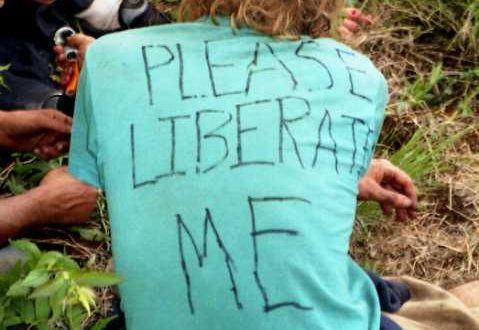The image here is ironic because the subject appears self-imprisoned in victim consciousness. If you’re looking for someone or something outside yourself for liberation, then you have just checked yourself into Super Max and thrown away the key. Obviously, this doesn’t apply to rare, objective, physical situations such as being a hostage. But it’s highly unlikely this applies to someone consulting an oracle online.
Some people define self-liberation politically and feel that what prevents their liberation is the Patriot Act and encroachments on their privacy and so forth. We can make a case for this POV for literal political prisoners, but even then, some strong people (EG Nelson Mandala) have found self-liberation while in the Gulag or Hanoi Hilton, etc.
Physical liberation in a corporeal incarnation is never fully attainable. Even if I were a billionaire with a diplomat’s passport allowing me to
travel anywhere, I’d still be imprisoned in a fragile body subject to accident, illness, aging, and, inevitably, death. Only death has the potential to liberate me from the constricting parameters of mortality.
“When the clock strikes me, the powers of being will prevail over the powers that be.” — Saul Williams
A more potent form of liberation than compromised physical liberation is free will. I believe that free will does exist, but is more rare and more fragile than most people would care to recognize. You cannot be free if you live in a deterministic universe, no matter what physical luxuries you have or your privacy or freedom of travel. In a deterministic universe, you can only be a puppet, and a puppet cannot be free. Many people live in a mostly deterministic universe because they don’t have enough self-awareness or independent consciousness to earn self-determination. Instead of free will, they submit to acquired conditioning and operate on mechanical habits and grooved patterns of reactivity.
A sufficiently self-aware person is capable of free will and may be in a state of self-liberation while in a concentration camp, a strait jacket, or a dying body lying on a hospital gurney. The liberation that matters during a human incarnation is cognitive liberty, the ability sometimes to choose your perceptions and definitions of inner and outer reality. It would be unethical shadow denial, however, to claim that’s possible for everyone in a highly distressed condition. An example of such shadow denial is people who say, “God only gives you the burdens you need to bear.” Explain that to an infant dying of leukemia.
An ultimate form of cognitive liberty allows you to be what J.R.R. Tolkien called a “subcreator.” A free-willed, self-aware, creative person can create their own world on the imaginal plane. Only someone who has experienced this freedom can fully understand how powerful and liberating it can be.
Yes, the government, the patriarchy, and so forth can further restrict our already limited physical liberty. The matrix of oppression can restrict our cognitive freedom in some cases by limiting our access to information and culture. But anyone with unfiltered internet access has more access to information and culture than any pre-internet head of state. Government can limit or punish access to consciousness-enhancing resources that have served for millennia as catalysts to cognitive liberation. There are walls all around us, but there are also cracks in the walls and often ways around them. Despite the Patriot Act, globalization, and so forth, most people in Western countries, people with food, shelter, and unfiltered internet access, have (from a historical perspective) unprecedented freedom. If you want to know what real outside oppression is, investigate what life is like for a Muslim woman in a fundamentalist regime. See: Jihad against the Feminine
The jailer that usually stands between myself and greater self-liberation is me. For the person reading this, the forces that most likely limit your self-liberation will be found in you, not society. Habits, mechanical patterns of thought and reactivity, neurotic delusions, disempowering self-definitions, indulging addictive appetites, etc. — these are the forces that usually curtail our cognitive and behavioral freedom and our free will.
For example, my range of self-liberation has expanded significantly in the last twenty-four hours because of a key realization. I realized that I have tended for decades to imprison myself with the belief that heroic efforts at self-discipline were the path of courage, of becoming stronger and more free-willed. Yesterday, I realized that what will liberate me far more at this phase of my development (in which I am relatively disciplined) is greater self-acceptance, not more forceful self-correction.
Looking outside for salvation encourages victim consciousness and being the slave of a person, obsession, or fundamentalism. Instead, look within to see how you imprison yourself, and you may find a key to self-liberation.
See: Rebelling from Victim Mentality and Self-Pity
 ZapOracle.com home to the free 720-card Zap Oracle
ZapOracle.com home to the free 720-card Zap Oracle






